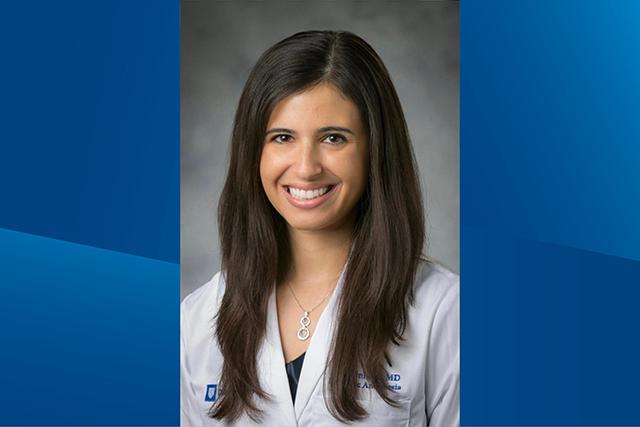
The National Institutes of Health and the Eunice Kennedy Shriver National Institute of Child Health & Human Development have awarded Duke Anesthesiology’s Lisa Einhorn, MD, a five-year $2,204,322 R01 grant for her project titled, “Revolutionizing Pediatric Tonsillectomy Pharmacology and Therapeutics.” The funding will support a fully powered randomized controlled trial using IV methadone in almost 400 children undergoing tonsillectomy with the goal to analyze both efficacy and safety outcomes in age-specific populations.
Safe and effective analgesia after surgery in children remains a significant public health concern. For moderate to severe acute postoperative pain, opioids remain the mainstay and most efficacious systemic pharmacologic therapy. However, adequate pain treatment in pediatrics is limited by insufficient understanding of the dose-dependent clinical effects of even widely available opioid analgesics.
Every day, anesthesiologists and surgeons face the challenging task of balancing pain relief with concerns for opioid side effects, patient and parental satisfaction, and compliance with opioid prescribing regulations. The need for optimal pain management after tonsillectomy - the most common painful elective procedure in children - highlights the importance of addressing inconsistent opioid prescribing practices, particularly for the 500,000 children who undergo tonsillectomy each year.
Recent advances in perioperative opioid use in adults, specifically the use of long-acting opioids like methadone, have shown promise in reducing postoperative pain and minimizing opioid prescriptions. However, the use of methadone in children for surgical pain management is limited by inadequate clinical and safety data, particularly in outpatient settings like tonsillectomy.
Einhorn’s research will focus on determining the optimal age specific, weight-based dose of intraoperative methadone, a long acting, cost-effective and widely available analgesic, for outpatient tonsillectomy in children to improve analgesic outcomes and decrease or eliminate the need for postoperative take-home opioids. Her trial will 1) determine the optimal age-specific intraoperative dose of IV methadone in pediatric tonsillectomy that results in less postoperative pain and opioid use compared with short-acting opioids, and 2) assess the impact of long versus short-acting intraoperative opioid on post-tonsillectomy recovery outcomes.
“Despite decades of research, there remains an urgent need to manage acute post-tonsillectomy pain both safely and effectively, particularly in an era when prescribing “take-home” opioids must be carefully considered due to the known risks of opioid-related harms in children and adolescents,” says Einhorn, associate professor of anesthesiology. “When our study is complete, we expect to have advanced the understanding of pediatric methadone pharmacology, improved analgesic outcomes in a population of children and adolescents with acute surgical pain, enabled reduced postoperative opioid prescribing, and achieved safer and more effective pediatric precision medicine. I am honored to receive this funding from NICHD to conduct this important work and am grateful for the support of my department, mentors, and colleagues who have been instrumental in my development as a physician-scientist."